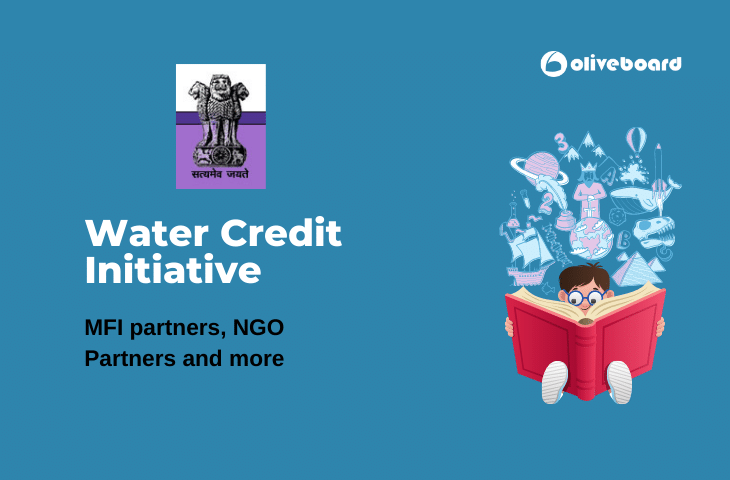Affordable financing is one of the biggest roadblocks to safe water & sanitation. To address this issue head-on, the Water Credit Initiative® loan programme was launched. Gary White, a social entrepreneur, & Matt Damon, have invested US$ 2.2 million in Water Credit programmes through their business Water.org. In underdeveloped nations, water credit uses microfinance concepts to help with water & sanitation. Water-Credit allows people to handle their own water & sanitation requirements rather than relying on government finances & charity by providing small loans to individuals & communities that have no access to credit.
There is no one-size-fits-all answer to the global water crisis, with millions of people affected around the world. The approach to the water credit initiative is market-driven & people-driven since it has improved the lives of over 38 million people.
Water Credit Initiative
The Water Credit Initiative is a new place at the crossroads of water, sanitation, and microfinance that aims to help those in developing countries who are in need of safe water & sanitation. The number of people who want water projects vastly outnumbers the amount of money available. Communities who need it are obliged to enter the “grant lottery” & hope that someone will come to their help at some point. Meanwhile, they are becoming ill and dying as a result of the contaminated water they are drinking.
Because they lack the upfront funds to make the necessary investments, many low-income organisations have been unable to obtain water connections or construct toilets. Since borrowing for water & sanitation renovations has historically been regarded too hazardous & not viewed as an income producer, neither banks nor MFIs have responded to this market.
As a result, the Water Credit Initiative was established, with the goal of speeding up natural market processes. This entails providing financing for “smart subsidies” to help create a market for water & sanitation microfinance. Water Credit models take advantage of local resources and speed up natural market processes, allowing them to serve a larger number of people in a shorter amount of time.
Water Credit must eventually engage international capital markets to contribute with funding for water supply & sanitation projects in order for the model to be viable. This form of finance will be possible if philanthropic-driven “smart subsidies” lead the way, according to Water Partners. In countries such as India, Kenya, Bangladesh, Honduras, & Uganda, the use of “smart subsidies” for Water Credit projects has already sparked interest from commercial financing institutions, & in some cases, direct commercial loans.
Water Credit had disbursed approximately $1.6 million in loans to end borrowers as of 2009, with nearly $750,000 coming from commercial financing sources. Water Partners continues to enhance & expand its Water Credit Initiative in order to advance the market for water & sanitation microfinance.
What Does Water Credit Initiative Provide?
Water Credit connects together commercial banks, microfinance institutions (MFIs), non-governmental organisations (NGOs), governments, water authorities, financial intermediaries, and other Watson service providers to improve access to safe water and sanitation for economically active poor families.
Water Credit focuses on personal & household microloans, which are often offered via MFI self-help group models & target a pricing range that is suited for clients at the bottom of the economic pyramid.
How Water Credit Initiative Works
Water credit, as we’ve seen, is a powerful solution that was the first to use microfinance methods in the water & sanitation sector. Small loans & expert resources are made available through Water credit to those who need them to make household water & sanitation solutions a possibility.
- The first step is to locate a region in need of water & sanitation that is also ready for a microfinance solution.
- The next phase in this process is to engage with selected institutions to provide reasonable financing for water & sanitation to low-income homes. Water & sanitation loans are added to the portfolios of these microfinance partners.
- These small, reasonable loans are used by those in need to install a tap or toilet in their houses and to leverage local resources to complete the work.
- Every loan that is returned can be given to another family in need of clean water or sanitation.
Water Credit MFI partners
Water Credit MFI partners include:
- BISWA – Bharat Integrated Social Welfare Agency – Orissa State
- BASIX – Hyderabad
- ESAF – Evangelical Social Action Forum – Kerala
- GUARDIAN – Gramalaya Urban and Rural Development Initiatives and Network – Tamilnadu
- Hand in Hand – Tamil Nadu.
NGO Partners Of Water Credit
- GRAMALAYA – Tiruchirapalli, Tamilnadu
- MSSS – Mythri Sarva Seva Samithi – Bangalore, Karnataka
- ODP – Organization for the Development of People – Mysore, Karnataka State
- SIDUR – Society for Integrated Development in Urban and Rural – Hyderabad, Andhra Pradesh.
Future Of Water Credit Initiative
Water Partners does not want to be the world’s water bank. They consider their function as one of speeding up natural market processes. This entails cultivating ties between microfinance institutions & non-governmental organisations working in the water & sanitation sector in order to better understand one another, in some circumstances, hybrids of the two are even possible.
Water Credit Initiative was designed to help close the gap between current attempts to solve the worldwide water crisis and people’s needs. Water Credit is growing in popularity, and its influence is growing as well.
FAQs
Current financing options are insufficient to handle the global water crisis. Grants solely will never be enough to reach the one billion people who need clean water. People are frequently forced to wait decades for a grant that may never arrive, which is why the Water Credit project was created.
The response to the success of the water credit was overwhelmingly positive. Water Credit trial initiatives began in 2004 in Dhaka, Bangladesh’s urban slums, and rural Tamil Nadu, India’s southern state. Kenya was added to the Water Credit Initiative in 2005.
